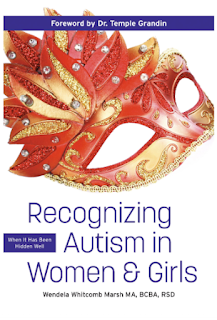I've always found it strange that autism seems to be mainly a "boy thing". Statistically, autism is recognised four times as often in boys as it is in girls but I've personally gotten much better at recognising the signs and I've gotten that "autism vibe" just as often from girls as I have from boys. I've always felt that it was simply harder to diagnose.
I was very keen to review this book because it's all about improving that recognition.
The book is called
Recognizing Autism in Women & Girls: When it has been Hidden Well
by Wendela Whitcomb Marsh MA, BCBA, RSD.
Published by Future Horizons Inc 2022.
Layout
At 216 well spaced and neatly laid out pages, this book is very easy to read and after a forward by Dr Temple Grandin, its chapters move through each of the diagnostic criteria in the Diagnostic and Statistical Manual of Mental Disorders 5th edition (DSM V) which is the currently main tool for autism diagnosis. The last few chapters cover a bit of post-diagnosis and diagnosis-related material.
Each chapter starts with one or two very relevant quotes, one of which is usually the criteria from the DSM V. Following this, there is an explanation of how that criteria presents with a bit of emphasis on women and girls.
The next sections cover the specific way in which this particular trait presents itself in "seven fictional women" with each woman having a subsection to herself (more on that later).
The chapters end with a round-up, appropriately called "behind the mask" which provides you with a series of questions that you can ask to help determine if a particular person matches the criteria.
The chapters end with insightful pieces called "in her own words" in which a different women per chapter talks about her particular traits and experience.
Insights
- There's the standard method, cover-to-cover, where each chapter has insight on how each of these seven women present their symptoms. This is great when you're comparing and contrasting different presentations.
- There's also an opportunity for you to get to know each of the clients by looking at their collections of traits. For example, you may want to read through all of the sections on Penelope to understand how her various traits present and get a feel for how she would present as a whole person.

Comments
When I read the blurb I thought there were *five*.
You say there are *seven*.
[or are there two who didn't mask?]
[in "Things I'm Writing].
Good to know the other women besides Penelope.